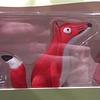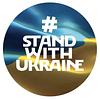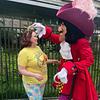Take a photo of a barcode or cover
3.5 Stars
I found this book interesting and I did learn a lot. Not just about pirates and their history, but also about where our cultural imagery and references concerning pirates come from. I genuinely appreciated the backtracking of cultural influence.
That being said the drinking game for this book would be for every time the word 'Hollywood' is said. Considering that there are only a handful of pirate movies, half of which are a part of the Disney Pirates of the Caribbean franchise and the other half I've never heard of, mentioning 'Hollywood' two or three times a chapter seemed a bit excessive.
Whenever 'Hollywood' was written the tone is always of disdain for spreading inaccurate myths, but as the book points out that's a tradition as far as pirate stories are concerned. (And I should hope that no one has watched a Pirates of the Caribbean movie, especially World's End, and thought it was in any way historically accurate.)
It's a shame that this book must have already been in the publishing process when the TV show Black Sails aired. The show seemed to have gotten it more right than 'Hollywood' usually does and where it leans into the fictional narrative it's because well...half of it's characters are fictional. This book actually helped me to better understand what the show pulled from history and what it pulled from fiction.
I found this book interesting and I did learn a lot. Not just about pirates and their history, but also about where our cultural imagery and references concerning pirates come from. I genuinely appreciated the backtracking of cultural influence.
That being said the drinking game for this book would be for every time the word 'Hollywood' is said. Considering that there are only a handful of pirate movies, half of which are a part of the Disney Pirates of the Caribbean franchise and the other half I've never heard of, mentioning 'Hollywood' two or three times a chapter seemed a bit excessive.
Whenever 'Hollywood' was written the tone is always of disdain for spreading inaccurate myths, but as the book points out that's a tradition as far as pirate stories are concerned. (And I should hope that no one has watched a Pirates of the Caribbean movie, especially World's End, and thought it was in any way historically accurate.)
It's a shame that this book must have already been in the publishing process when the TV show Black Sails aired. The show seemed to have gotten it more right than 'Hollywood' usually does and where it leans into the fictional narrative it's because well...half of it's characters are fictional. This book actually helped me to better understand what the show pulled from history and what it pulled from fiction.
adventurous
informative
slow-paced
As with [b:The Sea Rover's Practice: Pirate Tactics and Techniques, 1630-1730|8299202|The Sea Rover's Practice Pirate Tactics and Techniques, 1630-1730|Benerson Little|https://images.gr-assets.com/books/1466208783s/8299202.jpg|119518] very good research material, but some bits feel like the author adjusted some facts to suit his personal theories. So, good for research, but take with a grain of salt.
adventurous
challenging
dark
funny
informative
inspiring
reflective
medium-paced
This was an informative, well-written book in which the author seemed maybe a little bitter that real life pirates were not like romanticized movie pirates and burdened with the obligation to disillusion the rest of the readers. Mind you, I think it's probably important that we don't forget the amount of raping that real life pirates likely did and it's important to remember that real life pirates were not egalitarian freedom fighters but in fact traded slaves themselves. It's a non-fiction book, and it's not his job to give the readers the romanticized definition.
But I don't know, I've read non-fiction books that talked about what actual Golden Age pirates were like without quite being this much of a downer. Books that didn't read as though it was the author's sacred duty to give every reader a harsh reality check but handled the material in a balanced way. There wasn't much information in here that I didn't already know, so I didn't get much from this. I did think the way he discussed pirate battles from a logistical standpoint was pretty cool, though.
But I don't know, I've read non-fiction books that talked about what actual Golden Age pirates were like without quite being this much of a downer. Books that didn't read as though it was the author's sacred duty to give every reader a harsh reality check but handled the material in a balanced way. There wasn't much information in here that I didn't already know, so I didn't get much from this. I did think the way he discussed pirate battles from a logistical standpoint was pretty cool, though.
This book takes myths about pirates and piracy and debunks them one by one. It limits itself with piracy by Europeans in 1650-1725 primarily in the Caribbean. The book is quite interesting, rich in details, with large bibliography and massive footnotes. Sometimes it goes too greatly into the details like discussing which fencing techniques and more specifically feints and hits could have been used by dueling pirates and the like. It cites a lot of fiction and film and show where they err.
The [non-exhaustive] list of myths:
- Pirates usually used black flags with skull and bones
- They used galleons as their ships and hunted galleons
- They often fought and boarded ships
- Their primary weapon is a cutlass
- They primarily hunted in the open ocean
- They were rebels
- They fought slavers
- There was a pirate kingdom
- There were female pirate captains
- There were non-white pirate captains
- There were pirate treasures
Most of these things had a grain of truth but were exaggerated out of proportion.
An interesting read for all the lovers of pirate fiction.
The [non-exhaustive] list of myths:
- Pirates usually used black flags with skull and bones
- They used galleons as their ships and hunted galleons
- They often fought and boarded ships
- Their primary weapon is a cutlass
- They primarily hunted in the open ocean
- They were rebels
- They fought slavers
- There was a pirate kingdom
- There were female pirate captains
- There were non-white pirate captains
- There were pirate treasures
Most of these things had a grain of truth but were exaggerated out of proportion.
An interesting read for all the lovers of pirate fiction.
This was such an interesting read. Pirates have always been fascinating, but this book really helped to differentiate between the fact and the fiction surrounding these mythologized characters of history. I highly recommend it as a read.
adventurous
informative
slow-paced
Interesting read. The media has cultivated an image as gospel on what pirates were like. It should not really be a shock that they get a lot wrong when you consider the time that has passed. This book could be summed up in one phrase "Carribian Pirates = Fake News".
The author tends to ramble. At times he is all over the place. It seems sometimes he confusionally shifts from telling a fact just to dismantle it and tell another version of fact that opposes the original fact.
That being said, it is still enjoyable and packed with uncommon knowledge and theory on the subject. Most notably on how notorious pirate captains may not have been fearsome as most claim and also an interesting chapter on woman in piracy.
The author tends to ramble. At times he is all over the place. It seems sometimes he confusionally shifts from telling a fact just to dismantle it and tell another version of fact that opposes the original fact.
That being said, it is still enjoyable and packed with uncommon knowledge and theory on the subject. Most notably on how notorious pirate captains may not have been fearsome as most claim and also an interesting chapter on woman in piracy.





